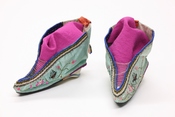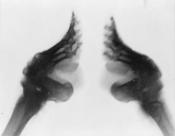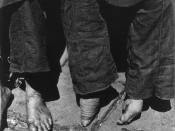Traditional Chinese society was patriarchal, patrilineal, and patrilocal. In this male dominated society, sons were preferred to daughters, and women were expected to be subordinate to their fathers, husbands, and sons. Because marriages were arranged, young women and men had virtually no voice in the decisions on their marriage partner, resulting in loveless marriages. Once married, it was the woman who left her family and community and went to live with her husband's family, where she was subordinate to her mother-in-law. In some cases, female infants were subjected to a high rate of infanticide, or sold as slaves to wealthy families. Men were permitted to take as many wives as they wished and bound feet, which were customary even for peasant women, symbolized the painful constraints of the female role. Chinese women were considered second-class citizens and were subject to the wishes and restraints of men.
The basic unit of Chinese society, the family, was male dominated.
The oldest living male ruled the patriarchal Chinese family. As the head of the family, the grandfather or father decided whom the children and grandchildren would marry. Because the Chinese practiced a patrilineal system, ancestry was only traced through the male side of the family. When a woman married in the patrilocal system, she was no
longer a member of her own family and was sent to live with her husband's family. Her mother-in-law was to be considered her own new mother and her authority was absolute. The way that a mother-in-law would treat the new wife was so harsh that sometimes it leads to suicide.
Daughters, whose long-term contribution to their families was limited, were valued much less than sons. Traditional Chinese philosophy was that, "raising daughters is like raising children for another family". After O-lan delivers her first daughter, in the...


